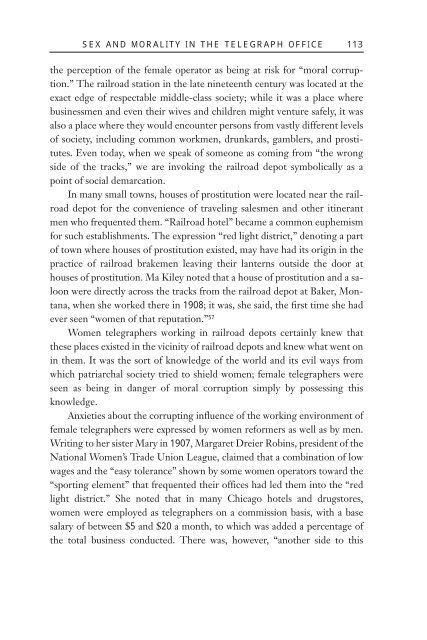My Sisters Telegraphic: Women in the Telegraph Office ... - Monoskop
My Sisters Telegraphic: Women in the Telegraph Office ... - Monoskop
My Sisters Telegraphic: Women in the Telegraph Office ... - Monoskop
Create successful ePaper yourself
Turn your PDF publications into a flip-book with our unique Google optimized e-Paper software.
SEX AND MORALITY IN THE TELEGRAPH OFFICE 113<br />
<strong>the</strong> perception of <strong>the</strong> female operator as be<strong>in</strong>g at risk for “moral corruption.”<br />
The railroad station <strong>in</strong> <strong>the</strong> late n<strong>in</strong>eteenth century was located at <strong>the</strong><br />
exact edge of respectable middle-class society; while it was a place where<br />
bus<strong>in</strong>essmen and even <strong>the</strong>ir wives and children might venture safely, it was<br />
also a place where <strong>the</strong>y would encounter persons from vastly different levels<br />
of society, <strong>in</strong>clud<strong>in</strong>g common workmen, drunkards, gamblers, and prostitutes.<br />
Even today, when we speak of someone as com<strong>in</strong>g from “<strong>the</strong> wrong<br />
side of <strong>the</strong> tracks,” we are <strong>in</strong>vok<strong>in</strong>g <strong>the</strong> railroad depot symbolically as a<br />
po<strong>in</strong>t of social demarcation.<br />
In many small towns, houses of prostitution were located near <strong>the</strong> railroad<br />
depot for <strong>the</strong> convenience of travel<strong>in</strong>g salesmen and o<strong>the</strong>r it<strong>in</strong>erant<br />
men who frequented <strong>the</strong>m. “Railroad hotel” became a common euphemism<br />
for such establishments. The expression “red light district,” denot<strong>in</strong>g a part<br />
of town where houses of prostitution existed, may have had its orig<strong>in</strong> <strong>in</strong> <strong>the</strong><br />
practice of railroad brakemen leav<strong>in</strong>g <strong>the</strong>ir lanterns outside <strong>the</strong> door at<br />
houses of prostitution. Ma Kiley noted that a house of prostitution and a saloon<br />
were directly across <strong>the</strong> tracks from <strong>the</strong> railroad depot at Baker, Montana,<br />
when she worked <strong>the</strong>re <strong>in</strong> 1908; it was, she said, <strong>the</strong> first time she had<br />
ever seen “women of that reputation.” 57<br />
<strong>Women</strong> telegraphers work<strong>in</strong>g <strong>in</strong> railroad depots certa<strong>in</strong>ly knew that<br />
<strong>the</strong>se places existed <strong>in</strong> <strong>the</strong> vic<strong>in</strong>ity of railroad depots and knew what went on<br />
<strong>in</strong> <strong>the</strong>m. It was <strong>the</strong> sort of knowledge of <strong>the</strong> world and its evil ways from<br />
which patriarchal society tried to shield women; female telegraphers were<br />
seen as be<strong>in</strong>g <strong>in</strong> danger of moral corruption simply by possess<strong>in</strong>g this<br />
knowledge.<br />
Anxieties about <strong>the</strong> corrupt<strong>in</strong>g <strong>in</strong>fluence of <strong>the</strong> work<strong>in</strong>g environment of<br />
female telegraphers were expressed by women reformers as well as by men.<br />
Writ<strong>in</strong>g to her sister Mary <strong>in</strong> 1907, Margaret Dreier Rob<strong>in</strong>s, president of <strong>the</strong><br />
National <strong>Women</strong>’s Trade Union League, claimed that a comb<strong>in</strong>ation of low<br />
wages and <strong>the</strong> “easy tolerance” shown by some women operators toward <strong>the</strong><br />
“sport<strong>in</strong>g element” that frequented <strong>the</strong>ir offices had led <strong>the</strong>m <strong>in</strong>to <strong>the</strong> “red<br />
light district.” She noted that <strong>in</strong> many Chicago hotels and drugstores,<br />
women were employed as telegraphers on a commission basis, with a base<br />
salary of between $5 and $20 a month, to which was added a percentage of<br />
<strong>the</strong> total bus<strong>in</strong>ess conducted. There was, however, “ano<strong>the</strong>r side to this

















